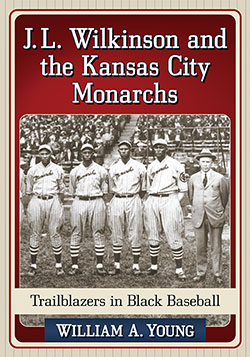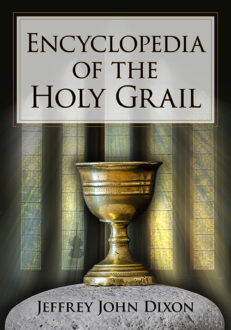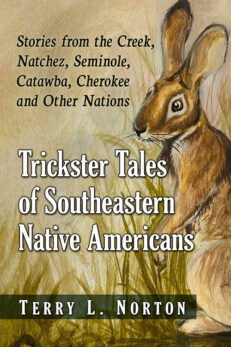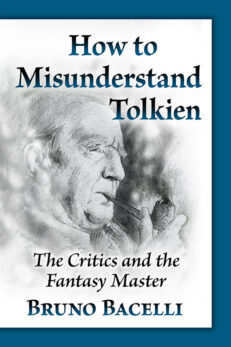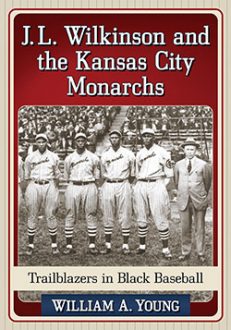J.L. Wilkinson and the Kansas City Monarchs
Trailblazers in Black Baseball
$35.00
In stock
About the Book
Baseball pioneer J. L. Wilkinson (1878–1964) was the owner and founder, in 1920, of the famed Kansas City Monarchs of the Negro Leagues. The only white owner in the Negro National League (NNL), Wilkinson earned a reputation for treating players with fairness and respect. He began his career in Iowa as a player, later organizing a traveling women’s team in 1908 and the multiracial All-Nations club in 1912.
He led the Monarchs to two Negro Leagues World Series championships and numerous pennants in the NNL and the Negro American League. During the Depression he developed an ingenious portable lighting system for night games, credited with saving black baseball. He resurrected the career of legendary pitcher Satchel Paige in 1938 and in 1945 signed a rookie named Jackie Robinson to the Monarchs. Wilkinson was posthumously inducted into the National Baseball Hall of Fame in 2006, joining 14 Monarchs players.
About the Author(s)
Bibliographic Details
William A. Young
Format: softcover (7 x 10)
Pages: 240
Bibliographic Info: 37 photos, appendix, notes, bibliography, index
Copyright Date: 2017
pISBN: 978-1-4766-6299-2
eISBN: 978-1-4766-2614-7
Imprint: McFarland
Table of Contents
Preface and Acknowledgments 1
Prologue: “A Thrilling and Fascinating Epic” 4
1. Early Life and a Start in Baseball (1878–1911) 7
2. Breaking New Ground—The All-Nations Team (1912–1919) 13
3. Founding the Monarchs and the Negro National League (1920–1923) 23
4. Negro National League and World Champions (1924–1929) 44
5. The Innovator—Night Baseball and Barnstorming (1930–1936) 68
6. Joining the Negro American League (1937–1938) 98
7. J. L. Wilkinson and the Rebirth of Satchel Paige (1938–1939) 106
8. The “Black Yankees”—The Monarchs Reach Their Peak (1940–1945) 118
9. J. L. Wilkinson, Jackie Robinson and the Integration of Baseball (1945) 139
10. Final Years for Wilkinson and the Monarchs (1946–1964) 157
Epilogue: The Long Road to Cooperstown 186
Appendix: Kansas City Monarchs Rosters and Records During the J. L. Wilkinson Era (1920–1948) 191
Chapter Notes 206
Bibliography 223
Index 227
Book Reviews & Awards
- “A fantastic addition to [the Negro Leagues] segment of baseball literature…long overdue…this important story needs to be told and William A. Young has done a phenomenal job in telling it… the author has done an exceptional job of letting Wilkinson’s record as a businessman, baseball man and human speak for itself… a thorough biography of a remarkable man”—Nine
- “Much of the overall history of black baseball has been told and told well, so it is left to writers like William A. Young to flesh out the details. He has done so in a both interesting and academically responsible way.”—The Inside Game, Newsletter of the SABR Deadball Era Committee
- “[A] fine work of biography for anyone interested in the inner workings of the Negro leagues, especially the earlier formative days. Young goes into incredible detail, and this work can serve as a primary resource as much as a work of analysis.”—Josh Howard, Sport in American History
- “A very good source of information on not only the Monarchs franchise, but also for the development of the Negro Leagues.”—The Guy Who Reviews Sports Books
- “Finally, a comprehensive narrative about one of the most influential power brokers in black baseball history, and the owner of the Negro League’s longest-running franchise. Young reveals Wilkinson’s personal challenges, as a white man, to integrate the landscape of black baseball, while winning a few championships along the way. This is a must read for any sports fan!”—Larry Lester, author, historian, and chairman of SABR’s Negro Leagues Committee
- “An important story of an important man. Young does a masterful job of finding the intersections of race, baseball, and finance in Wilkinson’s life and that of the Monarchs, allowing them to drive the narrative of the owner and his team.”—Thomas Aiello, author, The Kings of Casino Park: Black Baseball in the Lost Season of 1932.

